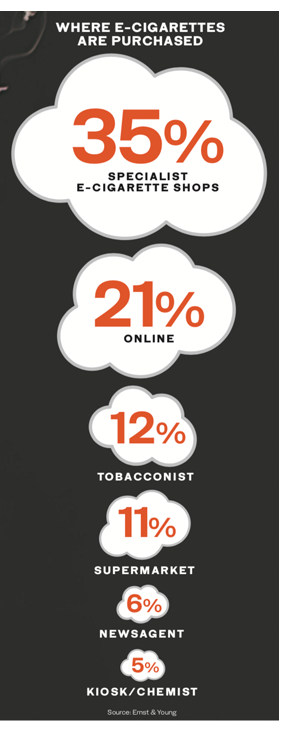RIYADH: While more Saudis are ditching their cigarettes and joining the vaping trend sweeping the world, the laws surrounding the activity in the Kingdom are shrouded in a fruit-scented haze.
There is no explicit law banning vaping in Saudi Arabia, and vapers are free to publicly indulge in the activity — but there are no legal ways to get a vape module, vape juice or any of the equipment needed to vape.
The Ministry of Commerce and Investment officially banned the sale of all e-cigarette or vaping products in September, 2015.
Saudi law forbids the sale of such items and considers anyone bringing them in from abroad to be smuggling and, therefore, liable to be fined and have the items confiscated.
The sales ban has forced vapers in the Kingdom to seek alternative methods of buying supplies, although the legality of these are doubtful, leaving vapers unsure if they are breaking the law.
The legal grey area means that people who spoke to Arab News for this article requested anonymity and their names have been changed.
Saudi Arabia has a high smoking rate, even though the practice is considered taboo. The Saudi Diabetes and Endocrine Association estimates the number of smokers is almost 6 million. This is expected to rise to 10 million by 2020, or roughly 30 percent of the population.
Is vaping better for your health than cigarettes? The healthiest way to smoke is to not smoke at all, but vaping is often presented as an alternative to the traditional cigarette.
 Vapes can still deliver a dose of nicotine to the body without the toxins and smoke damage. Nevertheless, vape products on the market come with a warning that is all but identical to those on cigarette packs: Adults only, no health benefits and a significant risk to health.
Vapes can still deliver a dose of nicotine to the body without the toxins and smoke damage. Nevertheless, vape products on the market come with a warning that is all but identical to those on cigarette packs: Adults only, no health benefits and a significant risk to health.
But vaping is shown to be less damaging overall than cigarettes, according to a long-term study published in the US medical journal “Annals of Internal Medicine.”
“There is almost no doubt that they expose you to fewer toxic chemicals than traditional cigarettes,” according to Dr. Michael Blaha, director of clinical research at the Johns Hopkins Ciccarone Center for the Prevention of Heart Disease. “But people need to understand that e-cigarettes are potentially dangerous to your health. You’re exposing yourself to all kinds of chemicals that we don’t yet understand and that are probably not safe.”
Despite this uncertainty, vaping has grown in popularity in Saudi Arabia in the past decade, particularly among the country’s youth.
Mohammed Idrees, a 35-year-old lawyer from Jeddah, said he took up vaping as a way of quitting his cigarette habit. He uses a Juul, a branded vape mod designed to help wean smokers off cigarettes. “As a bonus, it’s also cheaper than my cigarette habit used to be,” he told Arab News.
Nasser Riyadh, a 24-year-old programmer, said he only vapes occasionally to relieve stress. “I’ve been vaping two or three times a week for about a year,” he said. “It keeps me calm (and) helps me stay sane after a particularly difficult day at work.”
Those who choose to vape risk a run-in with the law to maintain their habit. Saudi Customs has told Twitter users asking about vape shipments that these are forbidden from being brought into or sold in the country.
Idrees, who buys his Juul pods from UK stores, has had shipments confiscated in the past. “At least, I assume they’ve been confiscated. They simply never show up, and I don’t get notified about it. But on the plus side, I don’t get fined either. The shipments I do get are the ones that fly under the radar,” he said.
Adnan Al-Awwad, a 30-year-old photographer from Tabuk, buys his equipment from local online stores. “There are several websites and Instagram accounts that provide everything from mods to liquids to full vape kits,” he said. “And they will deliver everything directly to your house and accept cash on delivery. It’s a method that keeps both buyer and seller anonymous and safe.”
However, most of the merchandise on these sites is illegally sourced. While neighboring countries such as the UAE have adopted similar stances towards vaping — selling the equipment is illegal but using it is fine — others such as Bahrain are more relaxed about vaping. With equipment and accessories easily found, Bahrain is a prime location for smugglers sourcing their goods.
However, under-the-counter sales carry an additional risk in the form of cheaply made and counterfeit products.
Buying counterfeit vape juice landed Abdulrahman Ali, a 29-year-old office worker from Riyadh, in hospital. “I bought a knockoff brand of vape juice and ended up getting a lung infection from it. I’m much more careful now with where I get my products from, and I consider myself something of an expert, but I worry about other people who might not have as much experience,” he said.
Ali, a cigarette smoker since he was 16, vapes as an alternative to smoking. He kicked the cigarette habit years ago and intends to keep it that way. “I don’t care if vaping becomes illegal in Saudi Arabia, I’ll still find ways to do it,” he said. I never want to go back to smoking cigarettes. Vaping is so much better, health-wise, because of the smell and because of the lighter side-effects. And it’s less expensive, too.”
But while some might see vaping as cool, chic or more acceptable than smoking, a negative atmosphere still lingers over vaper culture in Saudi Arabia.
“I don’t represent the community, nor do I consider myself part of it,” Idrees said. “I think a lot of people vaping these days are doing it for the cool factor, and I want to distance myself from that. I smoke out of necessity, as a remedy to an addiction.”
Riyadh agreed that part of his interest in vaping is down to image. “I would say that it’s about 40 percent image, 60 percent necessity,” he said.
Al-Awwad cautioned those interested in taking up vaping just for the image. “If you don’t smoke, or aren’t trying to quit smoking, then vaping isn’t for you,” he said.
Those who spoke to Arab News called for vaping equipment to be regulated in the country. “They will probably do it anyway,” said Al-Awwad. “And with Saudi Arabia’s smoking rate being as high as it is, this could be a lucrative area of investment.”
“Tax it. Double the price. Do whatever you have to do,” Idrees said. “Make it safer for everyone.”
However Alia Al-Mutabaqani, a mother of two, wished all types of smoking could be banned in the country. “It’s a disgusting habit,” she said. “My husband and both my sons do it. Everywhere I go, it’s just clouds of sickly sweet smoke. I want it all gone,” she said.

























